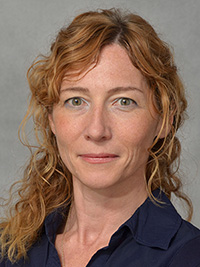June 1, 2019:
Investigator Spotlight:
Robert Kratzke, MD, University of Minnesota
Research interests:
I am a medical oncologist with a particular interest in lung cancer and mesothelioma. In my laboratory we are currently looking at the use of viruses for cancer therapy. In particular, the vesicular stomatitis virus (VSV) interests us as it preferentially infects cancer cells without causing disease in humans. We have shown that injecting the virus at one tumor will rapidly lead to infection in other tumor sites throughout the body. Also, the infection of the cancer cells not only kills malignant cells, it elicits an immune response that helps attack surrounding cancer cells without harming normal cells. Finally, this enhanced immune response makes the infected cancer cells more vulnerable to treatment with the modern immunotherapies such as pembroluzimab or nivolumab. In collaboration with Dr. Manish Patel we are currently running clinical studies at the UMMC using VSV.
Educational background
- BA, Pacific Lutheran University; MD, University of Washington; Residency (Internal Medicine), University of Wisconsin; Fellowship (Medical Oncology), National Cancer Institute (National Institutes of Health)
Little-known facts about Dr. Kratzke
- I was a four year letterman in crew (rowing) in college.
- My wife and I have played in handbell choirs for almost 30 years.
- In 1980 I was selected as one of four students to be a national All Star in College Quiz Bowl.
Thought Leader Perspectives
Veronika Bachanova, MD, PhD, Associate Professor of Medicine and Hematologic Malignancy Section Head, Division of Hematology, Oncology and Transplantation, University of Minnesota
 The advances in cancer therapies lead to better survival, and this would be unimaginable without the knowledge generated by basic scientists. The application of bench research facilitates recognition of critical targets, pathways, and resistance mechanisms, and promotes rationale combinations.
The advances in cancer therapies lead to better survival, and this would be unimaginable without the knowledge generated by basic scientists. The application of bench research facilitates recognition of critical targets, pathways, and resistance mechanisms, and promotes rationale combinations.
One of the prime examples in the field of hematology has been an insight into genetics in Hodgkin Lymphoma. PD-L1/PD-L2 alterations are defining features of classical HL. Amplification of chromosome 9p24 (where PD-L1 and JAK genes are localized) is associated with PD-L1/2 over-expression, and activation of the JAK-2 gene on the same segment leads to activation of STAT pathways; both mechanisms contribute to worse progression-free survival in some HL patients.
As a result of this insight, we recently launched an innovative clinical study combining PD-L1 inhibitor nivolumab and Jak1/2 pathway inhibitor ruxolitinib. This combination represents a novel, potentially synergistic approach for patients who previously failed check-point inhibitor. Detailed correlative research probing the primary tumor site and blood compartment are incorporated to gain new insights in vivo. We are excited the trial is offered through the Big Ten Cancer Research Consortium.
The need to recognize and understand the resistance mechanisms to immunotherapeutics is well established. Given the complexity of human immune responses, research in this area will rely on empiric and rationale combinations and explore the in vivo samples in basic research laboratories.
This trial, similar to many spearheaded by Big Ten investigators, represents another opportunity to leverage the expertise of Big Ten institutions and join the multi-institutional drive to beat cancer.
About the Big Ten Cancer Research Consortium: The Big Ten Cancer Research Consortium was created in 2013 to transform the conduct of cancer research through collaborative, hypothesis-driven, highly translational oncology trials that leverage the scientific and clinical expertise of Big Ten universities. The goal of the Big Ten Cancer Research Consortium is to create a unique team-research culture to drive science rapidly from ideas to new approaches to cancer treatment. Within this innovative environment, today’s research leaders collaborate with and mentor the research leaders of tomorrow with the unified goal of improving the lives of all patients with cancer.
About the Big Ten Conference: The Big Ten Conference is an association of world-class universities whose member institutions share a common mission of research, graduate, professional and undergraduate teaching and public service. Founded in 1896, the Big Ten has sustained a comprehensive set of shared practices and policies that enforce the priority of academics in the lives of students competing in intercollegiate athletics and emphasize the values of integrity, fairness and competitiveness. The broad-based programs of the 14 Big Ten institutions will provide over $200 million in direct financial support to almost 9,500 students for more than 11,000 participation opportunities on 350 teams in 42 different sports. The Big Ten sponsors 28 official conference sports, 14 for men and 14 for women, including the addition of men’s ice hockey and men’s and women’s lacrosse since 2013. For more information, visit www.bigten.org.
















Subscribe to the Big Ten CRC Newsletter X
X Facebook
Facebook YouTube
YouTube